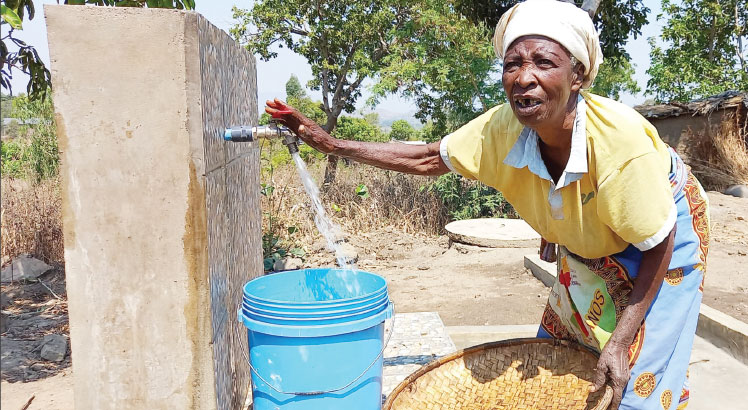Poverty to bite harder
I don’t think there is anything to be hopeful for in 2024,” laments Egrrey Mangulama from Traditional Authority (T/A) Ntchema in Chiradzulu District.
Seemingly frail, the 81-year-old, who occasionally gets monetary assistance from his children, fears hunger and food insecurity challenges will persist owing to a couple of factors which she anticipates will worsen her poverty levels in the current year.
“In the previous year life became hard to the point that I was even struggling to buy salt. Should I expect things to become better in 2024? My answer is no,” she said.
In an interview with The Nation, Mangulama said she fears for her well-being, especially considering that she is ageing.
The fears expressed by Mangulama come against the background of a myriad of challenges in the previous year that worsened poverty levels among Malawians.

This has resulted in a majority of Malawians living below the revised $2.15 World Bank poverty threshold, with the situation worsening for those earning below the K50 000 government minimum wage.
Among the many challenges Malawians faced in the previous year, and continue to be affected with at present are the continuous rise in inflation currently at 33.1 percent—the highest since April 2013, dry spells induced by El Nino which will affect crop output in 2024, and a high cost of living compounded by the 44 percent devaluation of the local currency.
In view of all these factors, Mangulama fears that 2024 does not hold any hope for Malawians. She is of the view that life will be hardened further.
She lamented: “Last year prices rose continuously and it was sad that the more they rose, the more we could not afford basic commodities.”
According to Mangulama, having expectations that things would turn out positive in 2024 is wishful thinking.
She said people must just be firm in whatever they are doing to support themselves and not expect more from others, stressing that everybody is busy trying to make a living amid the economic challenges.
“Towards the end of last year, I could not have proper meals because the situation became worse. The little money I could receive from my children dwindled each passing day,” said Mangulama.
Now as the New Year is supposed to bring renewed hope, Mangulama is of the view that 2024 will instead just bring further frustrations.
The fears and frustrations expressed by Mangulama mirror those of a million others who have faced numerous challenges in the preceding year as a result of a deteriorating socio-economic status.
But in his New Year’s address marking the start of 2024, President Lazarus Chakwera expressed optimism of a better economic climate following reforms his administration has been undertaking.
With an estimated population of 20.41 million as of 2022 and an annual growth rate of 2.6 percent, Malawi’s economy is expected to grow at 2.8 percent in 2024, supported by further anticipated macroeconomic reforms.
This is according to the World Bank which, however, states in its Malawi overview that such growth remains insufficient to substantially mitigate the prevailing high levels of poverty being experienced in the country.
According to the World Bank, with the persistent rise in inflation, rising domestic prices and an anticipated decline in per capita income, the percentage of individuals subsisting on less than $2.15 per day increased from 71 percent to 72 percent in 2023.
But while there are no fresh poverty projections for 2024, there are fears that more people will fall into extreme poverty levels in the current year due to several factors affecting the economy.
In its economic outlook for Malawi, the Economic Intelligence Unit (EIU) indicates that the poverty situation would escalate, triggering protests in 2024.
Reads part of EIU’s outlook: “Endemic corruption, a rising rate of poverty and limited economic opportunities will provoke public protests in 2024.
“We, nonetheless, expect the President, Lazarus Chakwera, and his nine-party coalition to remain in office until the end of their term in 2025, although the opposition could win the elections in that year.”
Chakwera, however, announced several social protection programmes that the government is implementing “to support the vulnerable” including the social cash transfer programme “which is targeting over 292 000 ultra-poor households in all the 28 districts of the country to reduce their exposure to risks associated with climate change and other disasters.
Malawi University of Business and Applied Sciences executive dean for the school of business and economic sciences Betchani Tchereni in a telephone interview said one of the strategies to ensure more Malawians do not slide into extreme poverty in 2024 is to stabilize food prices.
He said: “You will note that food, for instance, maize, has been increasing, and being one of the key drivers of inflation. So, if there is anything that will be done, the market has to be flooded with maize to stabilise prices.
“Food is taking up a greater chunk of people’s income, so if we handle this situation decisively, then we can solve one major nexus of the poverty situation in 2024.”
Tchereni further said there is need for import substitution and to ensure that some of the commodities are produced locally. This, he said, would ensure creation of more jobs locally; hence, putting money in the pockets of a majority.
Centre for Social Concern project officer Kondwani Hara in a separate interview said there is need to implement policies and trade practices that ensure the well-being of Malawians is met.
“This includes reviewing and adjusting tariffs, subsidies and market regulations to ensure the well-being of both farmers and consumers,” he said.
According to the World Bank, Malawi is the fourth poorest country in the world with 70 percent of its population living on less than $2.15 a day.





